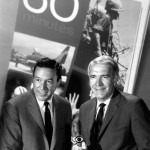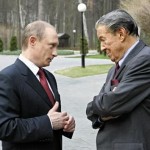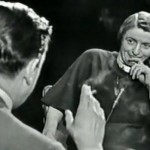When I began commenting on the deaths of famous people four years ago, the last thing I wanted was to contribute to our culture’s perverse fascination with celebrities. In fact, I only began this feature as a lark to propagate the superstition that the deaths of famous people come in threes.
I hereby declare that, henceforth, I shall comment only on the deaths of famous people who have made pioneering or extraordinary contributions to mankind.
(“Post Mortem on Deaths of Famous People Commentaries,” The iPINIONS Journal, June 4, 2010)
 Yesterday’s death of Mike Wallace vindicates my decision not to write commentaries on the recent deaths of three famous people – despite inquiries and prodding from readers. Because as famous as assembly-line “painter of light” Thomas Kinkade was, for example, he was no pioneer.
Yesterday’s death of Mike Wallace vindicates my decision not to write commentaries on the recent deaths of three famous people – despite inquiries and prodding from readers. Because as famous as assembly-line “painter of light” Thomas Kinkade was, for example, he was no pioneer.
By contrast, to appreciate why commenting on Wallace’s death is so warranted, all one has to know is that he was not just one of the founders of 60 Minutes, the most acclaimed and venerated news program in the history of television, but also its most dynamic, provocative, prosecutorial, versatile, and, above all, compelling reporter.
 Specifically, he pioneered the irreverent and combative style of interviewing that made 60 Minutes such must-see TV, giving it an unprecedented and unmatched run as a top-10 show from 1977-2001.
Specifically, he pioneered the irreverent and combative style of interviewing that made 60 Minutes such must-see TV, giving it an unprecedented and unmatched run as a top-10 show from 1977-2001.
And this style was always on display whether he was interviewing controversial world leaders like Iran’s Ayatollah Khomeini and Pakistan’s Pervez Musharraf, major newsmakers like tobacco whistle-blower Jeffrey Wigand and euthanasia practitioner Dr. Jack Kevorkian, political firebrands like PLO Chairman Yasser Arafat and NOI Minister Louis Farrakhan, iconic entertainers like actress Barbra Streisand and pianist Vladimir Horowitz, or countless scammers, fraudsters, and cheaters like Baseball pitcher Roger Clemens – who, after being indicted as a steroid abuser, earned the distinction of being the last person Wallace made squirm on 60 Minutes in January 2008.
In fact, regular viewers probably got as much enjoyment out of watching a Wallace interview as some people get out of watching a Snooki rant.
All of us at CBS News and particularly at 60 Minutes owe so much to Mike. Without him and his iconic style, there probably wouldn’t be a 60 Minutes. There simply hasn’t been another broadcast journalist with that much talent. It almost didn’t matter what stories he was covering, you just wanted to hear what he would ask next.
(Jeff Fager, chairman CBS News and executive producer of ’60 Minutes,’ CBS News, April 8, 2012)
I agree. Alas, all one needs to know about the state of television today is that it was reality-TV shows like American Idol and The Jersey Shore that pushed 60 Minutes out of the top 10….
I am always loath to comment on the private lives of public figures – unless they make a public spectacle of their private lives (a la Bill Clinton). In this case, however, it is worth noting the ironic public service Wallace provided by disclosing his private battle with depression, which became so acute after Vietnam-era General William Westmoreland sued him for libel in 1984 that he attempted suicide. Because knowing that this commanding, if not domineering, media personality could be humbled by depression is almost as instructive as seeing Mohammed Ali, “the greatest fighter of all time,” humbled by Parkinson’s.
 In a similar vein, it was interesting to hear his old friend, former CNN talk-show host Larry King, wax envious today about Wallace’s distinctive voice. After all, anyone who has seen Wallace honing his interviewing skills on his pre-60 Minutes show, Night Beat, knows that his habitual smoking probably did a lot to shape the sound of that voice.
In a similar vein, it was interesting to hear his old friend, former CNN talk-show host Larry King, wax envious today about Wallace’s distinctive voice. After all, anyone who has seen Wallace honing his interviewing skills on his pre-60 Minutes show, Night Beat, knows that his habitual smoking probably did a lot to shape the sound of that voice.
Which puts a completely different perspective on his dogged reporting later on 60 Minutes on the way tobacco companies were spiking cigarettes to keep smokers like him hooked. Reports are that after kicking this habit he developed a more obnoxious one of walking up to complete strangers and yanking cigarettes from their mouths. He was arguably on a one-man crusade to get as many smokers to quit as he helped get hooked as a spokesman for Parliament cigarettes during the early days of television.
All the same, there’s no denying that Wallace prided himself far more on his hard-nosed, investigative reporting than on his distinctive-sounding voice. Here, for example, is what the New York Times quotes him saying in its obit today:
Reputations for reporters are made by discovering things underneath that rock.
Indeed, his epitaph could say, He left no rock unturned.
Wallace died last night at an elder-care facility in New Canaan, Connecticut. He was 93.
Farewell, Mike.
Related commentaries:
Post mortem…
* This commentary was originally published yesterday, Sunday, at 7:34 pm